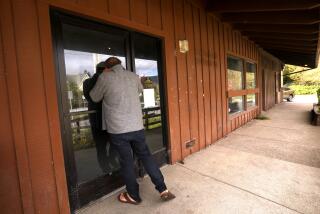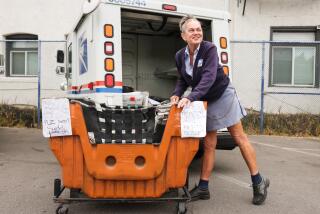Family Tells of Postal Worker’s Growing Complaints : Rampage Linked to Stress on Job
- Share via
ESCONDIDO — Relatives and colleagues of John Merlin Taylor, the 27-year postal veteran who went on a shooting rampage Thursday that left his wife and two co-workers dead, suggested Friday that the man who was described as a “model employee” was growing disillusioned with his work.
Attention also focused on Taylor’s alleged violent behavior against his former wife, Mary, who divorced Taylor in 1977.
Court documents in Vista Superior Court quoted Mary Taylor as saying she wanted to end her marriage because her husband was “extraordinarily violent, frequently drinks to excess, has threatened (her) life on many occasions and . . . physically struck, battered and beat (her) to the ground.”
But Ramon D. Asedo, the attorney who represented John Taylor in the divorce, disputed the allegations of drinking and beating.
‘Pleasant Separation’
“There was no showing of physical violence,” Asedo said Friday. “It was an extremely quiet, placid and pleasant separation. There was no real drinking or abuse, and that petition is just the kind of typical garbage we lawyers put in there.”
On Friday, Mary Taylor and her five children by that marriage declined comment. “We ask for your understanding, patience and empathy at this very difficult time for our family,” the family said in a prepared statement that was read at Palomar Medical Center, where Taylor remained in “very grave condition” on life-support systems.
Thursday’s shooting rampage began five blocks from Mary Taylor’s home, where her former husband shot his wife, Liesbeth, twice in the head as she lay in bed.
One of John Taylor’s three step-children said that the postal carrier had been complaining increasingly about the aches and pains of his job.
“He was complaining about his back, his heels, his shoulder hurting,” said Mike McMullen, 22.
Taylor, dressed in his postal uniform, then drove to the Orange Glen postal station about half a mile away, where he shot and killed two co-workers. Taylor then went inside and shot and wounded a third employee before shooting himself in the head.
McMullen discounted suggestions by neighbors that his mother and stepfather had marital difficulties. “They were very happy,” said McMullen, who did not live at the home but nearby in Escondido. “They were going to be leaving soon for a vacation back to Missouri to visit his (Taylor’s) mom.”
McMullen said his stepfather was able to put on a happy face at work, and generally did not complain at home about his job but nonetheless said he was growing weary of it.
He declined further comment, saying that he, his brother and his sister were considering hiring an attorney to pursue the matter. He would not elaborate.
Work at the post office, meanwhile, returned to something close to normal on Friday, as three psychologists mingled with employees who returned to work to face a backlog of undelivered mail.
“It’s a somber attitude inside, but they seem to be working like they were before the shooting,” said U.S. Postal Service spokesman Ken Boyd.
He said that of the 43 postal workers scheduled to work on Friday, two carriers and four clerks called in sick, and another worker showed up for work but then left. Postal workers from other stations were brought in, however, to help with the backlog of mail that had gone undelivered Thursday.
Throughout Escondido, mailboxes were adorned with yellow ribbons. One resident erected a makeshift American flag at half-staff on his mailbox. At the post office, several small bouquets were placed at the flagpole, and inside the building, 300 helium-filled balloons--donated by a local businessman--added an unusual splash of color.
At a Loss
Taylor’s mail route on Friday was handled by one of his closest friends, Jonny Sims, who said he was still at a loss to explain Taylor’s outburst.
“I know one thing--that was an awful lot of pressure at work, but it never seemed to bother him,” Sims said. “But Wednesday night he was bombarded with so much mail it was unbelievable.
“I said before that I thought that maybe it was something at home that got to him, but then why did he bring it to the post office?” Sims asked. “I can’t figure it, and I hate to play amateur psychologist.”
Sims said Taylor was a homebody who regularly declined opportunities to go out with co-workers after work. “He’d never go out with the guys,” he said. “He always wanted to go home, and he’d only go out with his wife. I always thought that his wife was his best friend--along with his children. They were his life.”
Both Sims and Taylor’s stepson discounted notions that the shooting may have been brought on by financial problems. “His wife was very frugal with money. There were never any problems with her spending too much. Besides, she had her own job and her own income.”
Edward Dunne, vice president of the postal union’s local in Escondido, dismissed contentions that the shooting could be attributed solely to any personal problems Taylor was having. Dunne also countered arguments by postal officials that a recent series of suicides and shootings by postal employees in post office buildings are not the result of high stress on the job.
“I really take exception to that,” he said. “It may be true that something in their personal life triggers it. But the very fact that they go to the post office to do these terrible, tragic acts where they take out other postal employees or a supervisor or take their own lives makes a very powerful statement.
‘Different Breaking Points’
“And that statement is that this job has produced a lot of my anxiety and a lot of my problems and a lot of my stress. These people are saying to us before they take their lives that maybe it’s time to enter the 20th Century and realize you can only push people so far,” Dunne said. “People have different stress levels and different breaking points.”
U.S. Rep. Jim Bates (D-San Diego) said Friday that he asked the House Post Office and Civil Service Committee to open a national inquiry into the recent series of shootings and suicides and their relationship to work stress.
“I would hope there might be some recommendations on how to improve postal operations and reduce the stress,” he said.
Critics of the post office management in San Diego say San Diego Postmaster Margaret Sellers and her managers often treat employees in ways that add immeasurably to the stress of jobs that are, by their nature, stressful because of ever-increasing demands on productivity. They say Sellers and her managers often demand that employees meet unreasonable production goals and subject them to harassment and pressure on the job.
Sellers could not be reached for comment Friday.
But Mike Cannone, a spokesman at the main post office in San Diego, denied that postal workers are under any more stress than other groups of workers:
More to Read
Sign up for Essential California
The most important California stories and recommendations in your inbox every morning.
You may occasionally receive promotional content from the Los Angeles Times.











